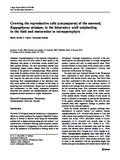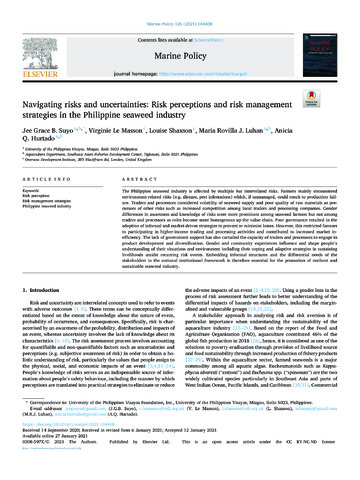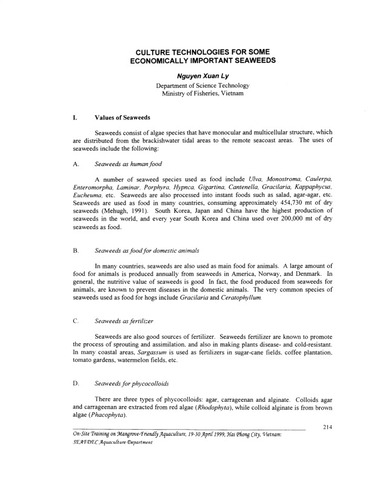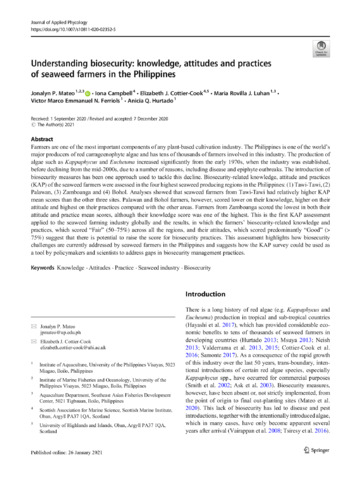Growing the reproductive cells (carpospores) of the seaweed, Kappaphycus striatum, in the laboratory until outplanting in the field and maturation to tetrasporophyte
Share
Abstract
Carposporophytes of the seaweed, Kappaphycus striatum, from the wild were made to shed spores in the laboratory and grown in multi-step culture method until they reached maturity. For each succeeding transfer onto increasingly bigger culture vessels, there was a marked increase in the growth of carposporelings. When plantlets were ready for outdoor culture, they were placed in aquaria and concrete tanks and later moved to the sea in net cage and long-line for grow-out culture. Successfully growing sporelings from carposporophytes in the laboratory until they reach market size seems to depend on the stage of sporelings and environmental factors such as photoperiod and temperature. In this study, carpospore progenies (diploids) also matured into tetrasporophytes and haploid progenies showed resistance to higher temperature.
Suggested Citation
Luhan, M. R. J., & Sollesta, H. (2010). Growing the reproductive cells (carpospores) of the seaweed, Kappaphycus striatum, in the laboratory until outplanting in the field and maturation to tetrasporophyte. Journal of Applied Phycology , 22(5), 579-585. https://doi.org/10.1007/s10811-009-9497-7
Subject
Taxonomic term
Collections
- AQD Journal Articles [1249]
Related items
Showing items related by title, author, creator and subject.
-
Navigating risks and uncertainties: Risk perceptions and risk management strategies in the Philippine seaweed industry
Suyo, Jee Grace; Le Masson, Virginie; Shaxson, Louise; Luhan, Maria Rovilla; Hurtado, Anicia Q. (Elsevier, 2021-04)The Philippine seaweed industry is affected by multiple but interrelated risks. Farmers mainly encountered environment-related risks (e.g. disease, pest infestations) which, if unmanaged, could result to production failure. ... -
Culture technologies for some economically important seaweeds
Ly, Nguyen Xuan (Aquaculture Department, Southeast Asian Fisheries Development Center, 2000) -
Understanding biosecurity: Knowledge, attitudes and practices of seaweed farmers in the Philippines
Mateo, Jonalyn; Campbell, Iona; Cottier-Cook, Elizabeth; Luhan, Maria Rovilla; Ferriols, Victor Marco Emmanuel; Hurtado, Anicia Q. (Springer, 2021-01-26)Farmers are one of the most important components of any plant-based cultivation industry. The Philippines is one of the world’s major producers of red carrageenophyte algae and has tens of thousands of farmers involved in ...




